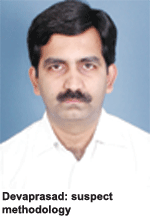Prior to June 15 when the new school year began in Tamil Nadu, parents of 5 million children enroled in the state’s 10,934 private matriculation schools affiliated to the Board of Matriculation Schools, and nursery and private schools affiliated with the Directorate of Elementary Education, paid widely varying first term tuition fees. While students of 4,534 private schools paid fees ranging from Rs.3,500-11,000 (for classes K-XII), as prescribed by the Private Schools Fees Determination Committee (PSFDC) headed by Justice (Retd) K. Govindarajan in July 2010, students of 6,400 private schools, which opposed the fees fixed by the PSFDC, paid fees mandated by school managements.
State government controls and ceilings in private K-XII schools affiliated with the Tamil Nadu State Board of Secondary Education (TNSBSE), which has 52,303 schools statewide affiliated with it (including 10,934 private schools), has been a contentious issue since December 2009 (CBSE, CISCE and schools affiliated with offshore examination boards are exempt) when the erstwhile DMK government enacted the T.N. School (Regulation of Collection Fee), Act 2009 and appointed the Govindarajan Committee (PSFDC) to determine the fees chargeable by each school.
Inevitably, PSFDC’s verdict was challenged in the Madras high court and Supreme Court. On April 9, 2010, the high court upheld the validity of the Act on the ground that it was in consonance with the law laid down by the Supreme Court in the Islamic Academy Case (2003) which allows government to constitute fees adjudication committees to prevent commercialisation of educa-tion. A year later on May 10, the Supreme Court also upheld the judge-ment of the Madras high court while stating that each school is free to petition the PSFDC for revision of the ceiling imposed in its case.
Meanwhile, in October 2010 the former DMK government appointed Justice Raviraja Pandian as chairperson of the PSFDC which revised the tuition fees of 6,400 aggrieved private schools upwards on June 13. However, even the new fee structure has greatly disappointed private matriculation school managements.
“Although we have received a 30-40 percent increase over the fees fixed by the Govindarajan Committee, the new tuition fees are still inadequate for providing quality education to students. For instance, we had requested an annual fee of Rs.28,000 for higher secondary school but have been sanctioned only Rs.15,500. Also since sanctioned tuition fee ceilings are valid for three years, we won’t be able to pay our Plus Two teachers well or give them annual increments. In turn this makes it difficult for us to recruit and retain good teachers,” says B. Purushothaman, correspondent and principal of Everwin Matriculation Higher Secondary School, which has an enrolment of 4,533 students and 178 teachers.
 Private school managements question the methodology employed by the new PSFDC to prescribe tuition fee struc-tures. “Schools without any claims to excellence but run by former politicians have been sanctioned very high fees. The tuition fees we have been sanctioned are far below expectation and will not cover expenses incurred by us on students’ participation in cultural activities, arts, sports and exchange programmes with foreign schools,” says Alfred Devaprasad, CEO of the Alpha Group of institutions.
Private school managements question the methodology employed by the new PSFDC to prescribe tuition fee struc-tures. “Schools without any claims to excellence but run by former politicians have been sanctioned very high fees. The tuition fees we have been sanctioned are far below expectation and will not cover expenses incurred by us on students’ participation in cultural activities, arts, sports and exchange programmes with foreign schools,” says Alfred Devaprasad, CEO of the Alpha Group of institutions.
The net result of the recently jettis-oned DMK government’s populist intervention to control the tuition fees of private schools is that neither school managements nor parents are satisfied. Some private school managements have appealed to the Madras high court against the fee ceilings fixed by the new PSFDC, while others plan to petition the newly elected AIADMK government for a solution.
In short, chaos and confusion reigns in Tamil Nadu’s 10,934 private schools a month after the start of the new academic year.
Hemalatha Raghupathi (Chennai)